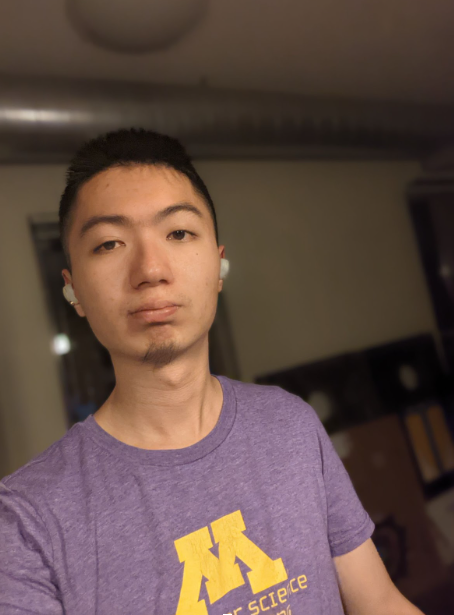CSpotlight: Leveraging Linguistics in Computer Science

Why did you choose to study computer science specifically at the University of Minnesota?
I’ve always been interested in computer programming and solving abstract problems, so I knew I wanted to study computer science and hone in on my specific interests while in school. In terms of the University of Minnesota, it was one of the better schools I got into and I enjoy living in the city. I really like this campus and I prefer being cold in the winter to being too hot in the summer so I don’t mind the cold that much.
How did you become interested in computer science?
Growing up, we always had a bunch of old technology in our house because one of my uncles had an IT job. I enjoyed playing around with that stuff and just got pretty good at it. I think I started actually coding when I was 7, and when I was 10 I asked my parents if I could take a coding course and they said yes. On top of all of that, I always had great math teachers, which helped me with some of the logic and patterns behind coding. Eventually I joined clubs that entered coding-type competitions and it helped me build up a strong base of knowledge and improved my thinking on the fly.
Congratulations on receiving the 2021 Maximillian Lando Scholarship! How has the scholarship impacted your academic career?
Thank you! I actually got the Computer Science and Engineering Department scholarship in 2020 as well. I think both scholarships helped provide some peace of mind and added financial security, since college can get expensive.
You also completed a minor in linguistics. What inspired you to pursue that academic area and how has it complimented your computer science degree?
Honestly the two started out as separate interests. I always enjoyed learning new languages growing up so I decided to try it out while I was in school. Initially, I didn’t realize that linguistics and computer science were so closely related. The study of analyzing natural languages is similar to learning and analyzing coding languages. There are a lot of things in natural language analysis that can be assisted by computer programs, so the two really naturally came together.
After taking a special topics class in functional programming, I started working on research projects with professor Van Wyk. We were doing work with programming languages but the tools we were using to analyze it were really similar to things I had learned in linguistics. I think my minor definitely helped with that project. That project focused on building parameters for code generation and actual grammar and rules in code.
Tell us more about your internship at Angi. What kind of projects did you work on?
I started applying for jobs my sophomore year through TechPoint, which is a program in Minneapolis that works with new companies. I interviewed for a few companies and ended up landing a position with Angi. I mainly worked in “DevOps” and my specific project was a migration from local files to better-configured secure storage. They wanted to move everything to AWS and they tasked me with managing and deploying that process. That opportunity gave me a better idea of what working in the industry is like - picking up tickets and working on issues, especially under a timeline. It really gave me a good feel for the pace of work in tech.
What advice do you have for incoming computer science students?
Don’t neglect the fundamentals! In your first year or two, make sure you really understand what you are learning because that will be the base that you can always come back to. Computer science is different from everybody and each person might have different areas of expertise and things that are more difficult for them. But if you have good fundamentals, you can work through issues and get pretty far.
Also, don’t be afraid to ask for help and collaborate. Sometimes you need an extra pair of eyes to work through a problem when you are stuck. In general, you need to be patient. Most projects take time to figure out and you will spend a lot of time fixing things and reworking things. You might need to take breaks and get more eyes on your work, but if you are patient and keep plugging away you will eventually get there.
What are your plans after graduation?
This summer I will be working with Enfusion in Chicago. The company focuses on financial technologies. I just started, but right now I am looking at and sorting through data. Next fall I will start my master’s degree at the University of Pennsylvania. Going forward, I hope to continue exploring different industries through tech and ideally it will open doors for me to travel and work in different countries.